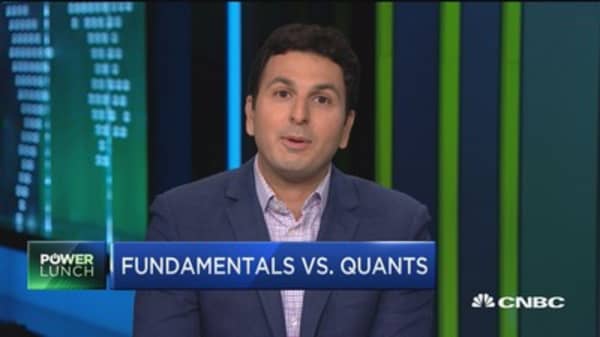Quantitative funds are all the rage lately, trading billions of dollars in assets and making headlines in recent weeks. But we were curious how portfolios run by computers and algorithms differ from those in fundamental-driven trading firms.
We studied data provided to us by eVestment, and the results were surprising. The institutional investor data firm looked at U.S. large-cap growth stocks and compared active strategies that take a fundamental approach to those that use a quantitative approach to security selection.
It turns out fundamental-driven active managers are much more likely to be drawn to big, household names. Think Visa, MasterCard, Alibaba, Alphabet, Priceline and Starbucks. Those stocks are skewed way to the fundamentals side, with comparatively little love from the quant shops.
"There are hundreds of stocks you could buy," said Mark Scott, vice president of corporate communications at eVestment. "For humans, those decisions could be impacted — consciously or subconsciously — by many factors outside of the numbers."
Look at the companies on the other side: Public Storage, Cintas, PNC Bank, Waste Management, John Deere and F5 Networks. Those stocks are the most heavily skewed to quant funds, relative to fundamental investors.
So it seems like quant funds tend to stay away from big brands, instead looking to find value in smaller, less commonly discussed companies.
That makes sense: Some experts think fundamental managers have to convince their clients with a good story, and picking big names like Facebook is an easy conversation to have. Quant funds on the other hand can focus more on mean-reversion stocks, risk-adjusted returns and high turnover.
There's also the matter of exchange-traded funds. About 40 percent of quant funds own the S&P 500 ETF, compared with 1 percent of fundamental funds. That suggests that quant funds own some of the broad market through index holdings, rather than the big popular stocks.
Quantitative hedge funds returned about 5.1 percent annually the last five years, compared with 4.3 percent for the average hedge fund, according to The Wall Street Journal. The higher returns have caused many in the investment business, including the head of BlackRock Larry Fink, to turn to computers to handle more investing duties.





